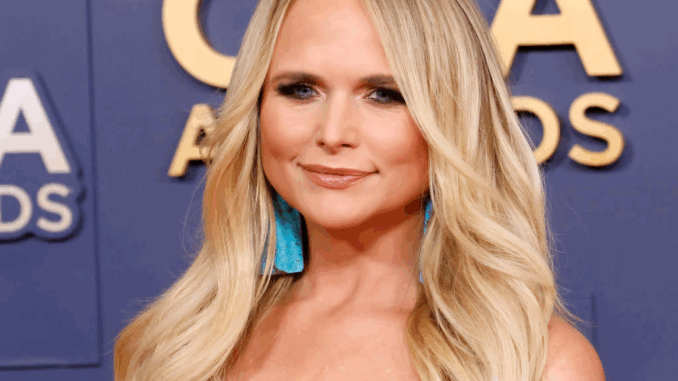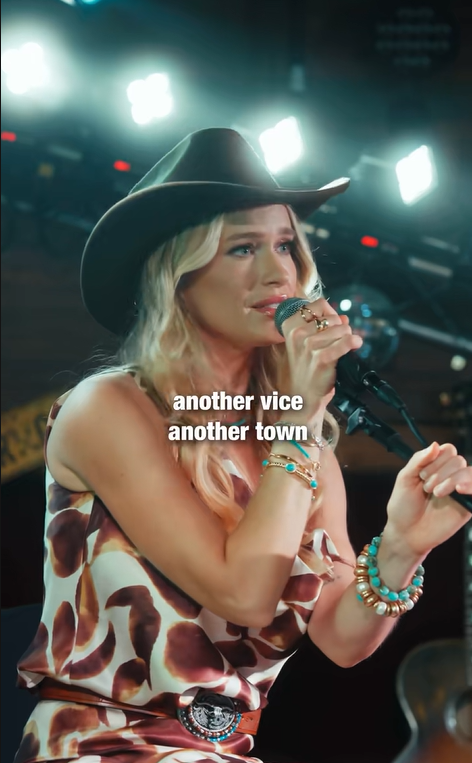
Imagine your favorite TV actors stepping off-screen and into the recording studio—releasing a heartfelt cover of one of Miranda Lambert’s songs, which is now prominently featured on Fire Country. That’s exactly what happened when Fire Country cast members Billy Burke and Leven Rambin released their version of “Vice,” bringing a fresh, emotional twist to a country music staple. This bold move isn’t just for show; it’s a statement of passion, artistic crossover, and connection with fans.
Let’s dive into what sparked this cover, how it unfolded, and why it matters for the show, the actors, and country music lovers everywhere.
Why Miranda Lambert? Why “Vice”?
A Song That Resonates Deeply
“Vice” is not just another country track. It delves into themes of struggle, regret, and the human impulse toward self-sabotage. It fits beautifully into dramatic contexts—making it an ideal pick for Fire Country. The emotional weight of the song mirrors many arcs of the show’s characters.
Blurring the Lines Between Fiction and Reality
By having characters on the show perform “Vice,” Fire Country blurs the boundary between narrative and performance. It enriches the viewing experience: a song is no longer just a soundtrack, but an extension of the characters’ inner lives.
How the Cover Came to Be
Casting Meets Musical Talent
Leven Rambin’s character, Audrey James, is written to be musically inclined. The showrunners recognized her abilities and built a moment around them. That creative choice opened the door to producing a real-world cover. The cover doesn’t feel tacked on—it feels organically tied to the show’s universe.

Recording the Cover vs. Performing On Screen
Recording a polished version of “Vice” required more than acting chops. Billy Burke and Leven Rambin collaborated in a recording studio, layering vocals and instrumentation. Then, inside the show, they performed a version adapted to the context of a Fire Country scene—rawer, emotional, connected to the storyline.
Release Strategy & Fan Engagement
When the cast released the cover beyond the episode, it became more than just a show moment—it became a piece of music that fans could stream, share, and connect with. That cross-medium strategy deepens fan loyalty and reaches new listeners.
Breaking Down the On-Screen Performance
Episode Context
In Season 3, Episode 5 (“Edgewater’s About to Get Real Cozy”), the characters find themselves in emotional stress. Audrey’s voice becomes a conduit for those unsaid feelings.
Dynamics Between Characters
The performance isn’t a solo spotlight. Vince (played by Billy Burke) supports Audrey with backing vocals or instrumentals. Their synergy adds depth—this is more than entertainment; it’s storytelling through music.
Cinematic Choices: Lighting, Framing, Energy
On-screen, the performance is framed intimately—close-ups, soft lighting, minimal distractions. The directors allow Audrey’s voice and vulnerability to stand at the forefront. You feel the song rather than just hear it.
What This Means for Fire Country
Elevating the Storytelling
This musical crossover makes Fire Country more than a drama—it becomes immersive. Viewers have emotional touchpoints that extend beyond plot into auditory experience.
Expanding Audience Reach
Fans of Miranda Lambert, country music, or musical performance might discover Fire Country via this cover. It’s a smart way to draw in viewers who might otherwise bypass a firefighting drama.
Brand Intersection: TV + Music
Producing a cover allows the show to stake a claim in the music world. It’s a content synergy strategy: the show lends narrative context, the cover lends authenticity and fan shareability.
Audience & Fan Reaction
Social Media Buzz
Fans shared clips, praised the actors’ voices, and expressed surprise and delight at hearing a beloved song reimagined. The cover sparked conversation, boosting engagement.
Emotional Resonance and Identity
Some listeners said the cover made them cry or reflect. Others appreciated hearing the characters “sing their feelings.” That connection is gold for storytelling.
Critiques & Praise from Country Music Fans
While many fans embraced the rendition, purists listened closely—judging tone, vocal performance, and fidelity to the original. Overall, the effort was met with admiration for its authenticity and character-driven delivery.
What Makes This Cover Special
Authenticity in Performance
This cover doesn’t feel like a copy—it feels like a translation from one emotional language (Miranda’s original) into another (the characters’ perspective). That’s rare and powerful.
Tonal Adaptation
The arrangement leans into acoustic tones, with subtle shifts to allow room for vocal emotion. It isn’t overproduced; it’s restrained, letting the lyrics and voice carry weight.
Narrative Alignment
Because the song is tied to character arcs, it carries symbolic meaning—Audrey is literally performing her internal conflicts out loud. That alignment heightens its impact.
Comparisons & Inspirations
Other TV Shows That Used Covers
Shows like Glee, Nashville, Empire, and Sons of Anarchy have used character covers to reinforce plotlines. Fire Country is now part of that tradition—but with its own twist.
What Sets This Apart
It’s not a musical series. Fire Country is a drama. So embedding a strong, emotionally honest song in this context hits harder. The surprise factor elevates it.
Behind the Scenes: The Actors’ Perspectives
Leven Rambin’s Musical Roots
Rambin has spoken (in interviews) about her love for music and how auditioning for a role that allowed her to sing was a dream come true. This performance lets her showcase more than her acting—her voice becomes part of her character’s identity.
Billy Burke’s Supportive Role
Burke isn’t just guiding his character; he’s participating musically. His backing support enriches the performance and shows camaraderie in the cast beyond drama.
SEO & Marketing Impact
Searchability & Keywords
Keywords like “Fire Country Miranda Lambert cover,” “Fire Country cast singing,” and “Fire Country ‘Vice’ performance” help connect show fans and music fans together.
Cross-Promotion Potential
Pushing the cover on music platforms, TV show promos, social media reels, and fan sites gives it multiple entry points. Every share helps spread the story.
Challenges & Risks
Expectation Management
Fans adore the original. The cast had high standards to meet—and not everyone expects or likes reinterpretations. A misstep could risk backlash.
Balancing Narrative vs. Musical Distraction
The show must avoid getting bogged down in concert-like moments. The song should serve the plot, not overshadow it.
What’s Next? The Future of Music in Fire Country
More Covers or Original Songs?
With success behind them, the show might lean into original songs or more covers tied to character arcs. That could expand its musical identity.
Fan Demand & Possibilities
If the fan reaction stays strong, showrunners might incorporate more musical moments, deeper performances, or even soundtrack releases.
The choice for Fire Country stars to release a cover of Miranda Lambert’s “Vice” isn’t just a gimmick—it’s a smart, emotionally rich storytelling tool. It bridges television and music, deepens characters, and invites fans into an experience that resonates on multiple levels. In short: it works. And it could open the door to more musical moments in the series to come.
FAQs
1. Which Miranda Lambert song did Fire Country stars cover?
They covered “Vice”, a deeply emotional track that resonates with themes of struggle and self-sabotage.
2. Who performed the cover in Fire Country?
Leven Rambin (as Audrey James) sang lead vocals, with Billy Burke (as Vince Leone) supporting musically.
3. Was this cover released beyond the show?
Yes. A fully recorded version was released separately from the episode, allowing fans to stream and share it.
4. Will Fire Country do more musical moments?
Given the positive reception, it’s highly possible. The show now has a proven model for blending drama and music.
5. How did fans respond to the cover?
Fans praised the emotional sincerity, vocal performance, and the way it deepened character arcs—many shared the performance widely and expressed delight.
